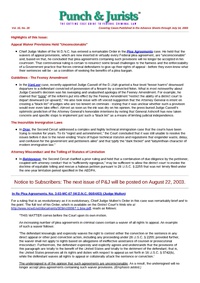Loaded on
Sept. 1, 2003
published in Punch and Jurists
July 14, 2003
Here, clarifying its prior decision in Smaldone v. Senkowski, 273 F.3d 133, the Court held that attorney conduct that is "suficiently egregious" may be enough to toll a statute of limitations for filing a petition for a writ of habeas corpus.
In this case, the Second Circuit clarified …
Loaded on
July 1, 2003
published in Punch and Jurists
July 14, 2003
Petitioner state prisoner was convicted of first degree murder in state court and was sentenced to death. The United States District Court for the Eastern District of California denied his petition for writ of habeas corpus. The state prisoner appealed.
Although the appellate court was disturbed by (1) the …
Loaded on
July 1, 2003
published in Punch and Jurists
July 14, 2003
“This case vividly illustrates the labyrinthine character of modern immigration law - a maze of hyper-technical statutes and regulations that engender waste, delay, and confusion for the Government and petitioners alike. The inscrutability of the current immigration law system, and the interplay of the numerous amendments and alterations to …
Loaded on
July 1, 2003
published in Punch and Jurists
July 14, 2003
The pritioner in this case, a federal prisoner proceeding pro se, appealed the dismissal of his petition, pursuant to 18 U.S.C. § 3663, for recalculation of the amount and manner of payment of restitution. On appeal, petitioner argued that the District Court erred by accepting the magistrate judge's characterization …
Loaded on
July 1, 2003
published in Punch and Jurists
July 14, 2003
Here, in granting a 4-level downward departure, Judge Cassell presented a lengthy apologia in defense of the Feeney Amendment and his conclusion that nothing in that legislation restricts the ability of a district court to depart under the Guidelines.
In this decision, Judge Cassell has written a lengthy …
Loaded on
July 1, 2003
published in Punch and Jurists
July 14, 2003
Here the Court held that waivers of appeal provisions (which are now standard in virtually all Federal plea agreements) are "unconscionable" and that plea agreements containing such provisions would no longer be accepted in the judge's courtroom.
For a ruling that is as revolutionary as it is evolutionary, …
